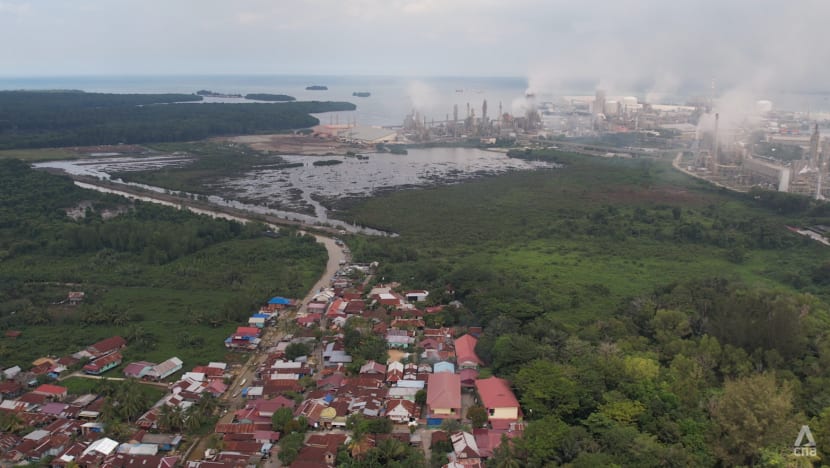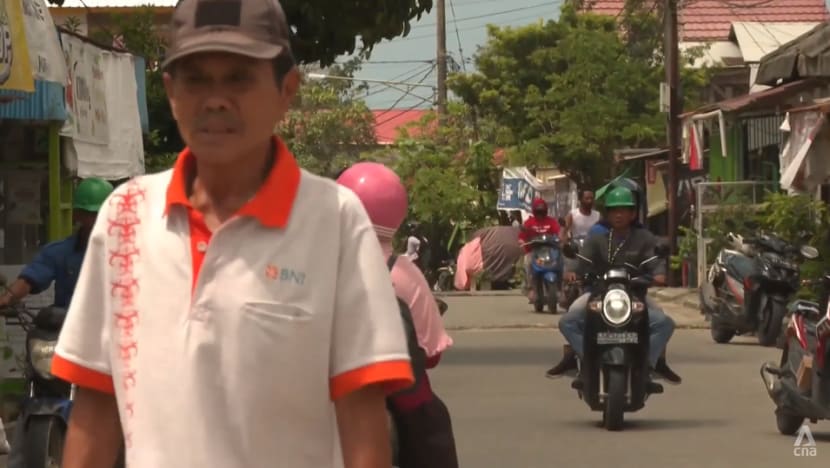Safety at some Indonesian fertiliser manufacturing plants in spotlight amid audits on vital state facilities
The increased attention to such facilities comes on the back of a deadly blaze in March at a fuel depot in North Jakarta operated by state-owned energy company Pertamina.

Guntung village, home to about 9,000 residents, is just 800m away from a fertiliser manufacturing plant. (Photo: CNA/Saifulbahri Ismail)
BONTANG, Indonesia: As Indonesia orders safety audits for vital state facilities, some fertiliser manufacturing plants have come under the spotlight.
A number of these plants are classified as vital because they play an important role in ensuring food security in the country.
The increased attention to such facilities comes on the back of a deadly blaze in March at a fuel depot in North Jakarta operated by state-owned energy company Pertamina.
The fire spread to a settlement next to the facility, killing 33 residents.
The incident led to the government ordering safety audits for vital state facilities across the country to prevent a similar incident.
THE BONTANG FERTILISER PLANT
Among the fertiliser plants categorised as a vital state facility is one in an industrial estate in Bontang, in the country’s East Kalimantan province.
Owned by Pupuk Kalimantan Timur, the enterprise produces non-organic fertilisers like urea, which uses raw materials such as ammonia.
When the plant was first built in 1977, there were few residents in the surrounding areas. Since then, communities have sprouted.
Separated by a buffer zone of vegetation and wetland is Guntung village, home to about 9,000 residents. It is just 800m away, making it one of the closest living areas to the fertiliser manufacturing plant.
Many of the village’s residents are employees of the state-owned facility.
While the village has prospered from the fertiliser business, residents have also long endured discomfort from the pungent ammonia smell.
"The odour problem is understandable because this is an ammonia plant, so there will be some smell. We have got used to this ammonia smell, which stings sometimes,” said village community leader Burhan Juhar.

“It depends on the wind direction. If the wind blows west, the smell goes to the other side, but if it blows south, the smell comes to Guntung.”
The firm has acknowledged the smell from its facilities but maintained that the emissions are not at dangerous levels and do not pose a health risk to residents.
The company said it abides by high safety standards and has measures in place in the event of a leakage.
It also said it conducts regular emergency drills to keep first responders alert for any possible incidents.
SAFETY MEASURES IN PLACE
Pupuk Kalimantan Timur’s vice president for safety and health David Ronaldo Manik said that the firm involves external parties in its safety protocols, including local representatives and the country’s health and disaster agencies.
“If something happens which has an impact on the community, the communication channels need to be clear. We hope there will not be any miscommunication between what happens in the facility and the information outside,” he said.
Mr David explained that the facility has four types of sirens depending on the nature of the incident. The first alerts residents that there has been a minor incident at the plant, and everyone should remain calm, while the second means the incident is being contained internally and only workers have to be evacuated.
The third siren is a signal that there is a leakage and residents could potentially be exposed to danger and people living nearby must be evacuated. The last type is an indicator that the risk has been contained and residents can return to their homes.
Residents in Guntung also take part in these emergency drills and are taught about the different types of sirens activated.
"If the siren is sounded three times, it means there is danger, and we should evacuate to a shelter which has been provided. If the siren is raised, we should be alert and wait for news from Pupuk Kalimantan Timur so we are informed, Guntung resident Hermanto Tutupoho said.
Related:
The State-Owned Enterprises Ministry said the impact of an explosion at a fertiliser plant which contains raw materials such as ammonia may be more devastating than the fuel depot blaze in March.
Ms Uslaini from environmental non-governmental organisation (NGO) WALHI said she hopes that authorities monitor these fertiliser manufacturing plants instead of leaving operators to assess their own ability to prevent incidents.
“The level of environmental impact is high, and the potential risk to the community is also high,” said Ms Uslaini, division head of the NGO’s Protection and Development of Community Management Area.
















